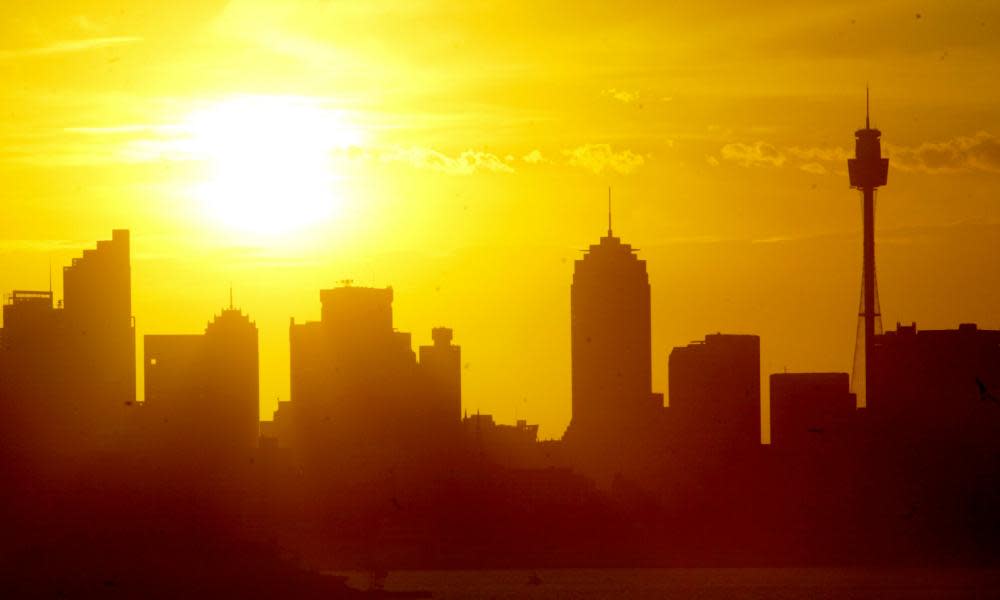Extreme heat and drought could cause summer blackouts, energy market operator says

Extreme weather over summer could reduce the output of coal, gas and hydro power generators and cause problems with the reliability of electricity supply, according to the Australian Energy Market Operator.
While there has been extensive political debate in Australia about the reliability of various forms of energy supply, the market operator will make the point on Friday that extreme weather imposes significant stress on the supposed ramparts of the system – thermal generators and transmission infrastructure.
Aemo will on Friday release advice about its summer readiness plan for 2018. It will nominate heightened risk courtesy of Bureau of Meteorology forecasts, which point to an elevated chance of bushfires, with drier conditions, increased temperatures, and an earlier start to the bushfire season – events scientists associate with climate change.
It says the weather bureau is predicting warmer-than-average temperatures in the coming months, with heatwaves of shorter duration in the south but longer duration in the northern regions.
“Extreme temperatures and extended heatwaves elevate the risk of extreme peak demands on the network, and can limit generator capacity or lead to equipment failures,” Aemo’s assessment says.
“Extreme temperatures and events including bushfires, lightning and storms can reduce the output of thermal, solar and wind generation, impact transmission lines and result in loss of supply. Drought is also a factor in the output of hydro generation, which uses water as fuel, and thermal generation, which uses water in cooling.”
Aemo has previously identified the risk of load shedding – blackouts to protect the network as a whole – in Victoria and South Australia over the looming summer under certain operating conditions. It notes the risk is heightened in Victoria and South Australia because generators have already signalled to the market that approximately 250 megawatts of thermal generation will be unavailable over the summer.
The market operator says it has sought additional reserves through its reliability and emergency reserve trader facility to manage the reliability and security risks. Part of the response will include demand management, with 132MW of reserves available to support reliability in Victoria.
Demand response involves paying energy users to reduce their power consumption, either by switching over to backup generation or storage when electricity reserves reach critically low levels.
The costs of contracting the additional supply are passed through to energy consumers. Last summer the total cost was $52m, which increased annual power bills by 0.3% or about $6 for each household account.
Aemo estimates the costs this summer will be lower, because only 40MW of resources are contracted, with additional resources on standby, compared with 1,141MW last summer.
Beyond the outlook for the coming summer, the market operator expects almost 6,000MW of new wind and solar to be added to the grid over the next two years.
Aemo’s chief executive, Audrey Zibelman, says the new supply “will alleviate the short-term risk of involuntary load shedding during summer peak periods” but says integration will be important to ensure ongoing reliability and stability of Australia’s power system throughout the year.
The assessment notes that the high uptake of rooftop solar is pushing back peak demand to later in the evening because power consumers are generating more of their own supply during the day. South Australia, the state with with the national energy market’s highest rooftop photovoltaic penetration as a percentage of peak demand, experienced its peak at 8pm (AEST) last summer.
Zibelman said she was confident Aemo had put in place the necessary procedures to minimise the risks over the coming summer.
“Aemo is confident the plans we have made and the targeted actions we have taken in collaboration with the wider energy industry and governments, have appropriately equipped us to tackle any unforeseeable events the upcoming summer might bring,” she said.

 Yahoo News
Yahoo News 
